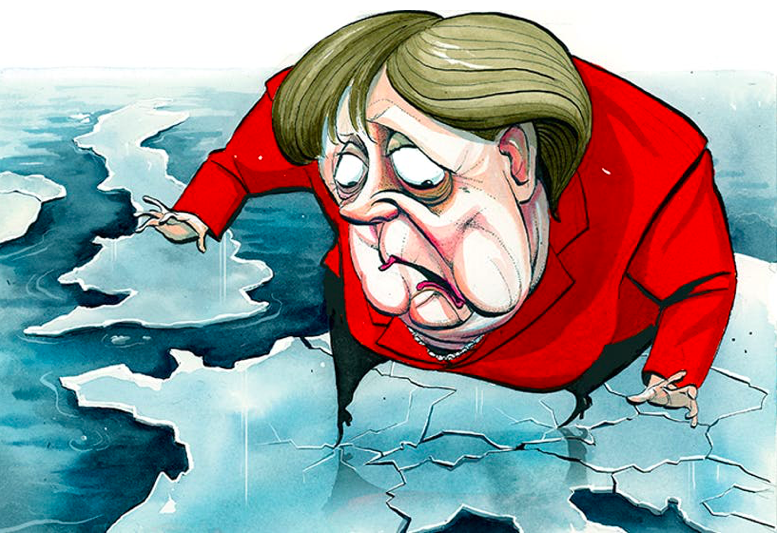‘France has a German policy, she has no other’, remarked the seasoned observer of international affairs and future editor of Le Monde André Fontaine in 1952. With a British withdrawal from the EU she is again confronted by an old demon dating from 1871 : management of a dominant Germany on the continent of Europe.
Paris has sought to counter German power, whether military, political or economic, by two broad means since 1900. The first means was to secure Britain as an ally and ensure she remained committed to the security of continental Europe. This she was successful in doing prior to 1914 and 1939. However, the immediate post-war years were a different story.
Her second means of countering German hegemony was to enmesh Germany in a European-wide political and economic organisation able to dilute her sovereignty and power. This she attempted unsuccessfully from 1925 to 1933, but which she finally achieved from 1951 through the various stages of European integration. Cynics claimed she was further aided by the Cold War division of Europe. The Nobel prize-winning writer Francois Mauriac struck a chord in 1967 when he cheekily remarked that he loved Germany so much that he was delighted there were two of them. When the Berlin Wall fell and German reunification was all but certain the wily Francois Mitterrand dealt with French anxiety about a neighbour now larger and more powerful than her by further enmeshing Germany in deeper EU institutions through the 1992 Maastricht treaty.
This poses the question of what France’s strategy vis a vis Germany will be following Britain’s departure from the EU. And how should Britain frame her diplomatic stance? The German problem for France is one that dare not speak its name, all the more so since the 1963 Franco-German friendship treaty, and its 2018 update. But as future president Georges Pompidou sagely warned on the German question: ‘one does not have to scratch too deep for the French once more to uncover an old aversion.’
The threat today is not military, but certainly economic, financial and inevitably political. With Britain’s withdrawal from the EU, France loses a counter-balance to her powerful neighbour and is left with 27 states that do not naturally align with French interests or methods. President Macron’s haughtiness and condescension have done nothing to improve that position. Nevertheless, his strategy appears to be going down the well-worn French route of seeking further to emasculate German power by submerging her sovereignty, economy and finances in deeper European integration through his calls for a renewed Europe.
Will he succeed ? So far, his great 2017 Sorbonne speech on the subject has been a flop, partly because of his inflamatory pronouncements about ‘populist’ member states and partly because of the fog of Brexit. He lacks the guile and mature charm of the unctuous François Mitterrand in the early 1990s. Even the object of his strategy, Germany, and the accommodating Mrs Merkel have pointed this out publicly to him. The Chancellor recently described her ‘confrontations’ with Macron as not just of substance but also ‘differences of mentality’, while Merkel’s CDU successor the francophile AKK referred to a ‘systemic difference of approach’ between Paris and Berlin.
For the moment the Franco-German axis is shaky. Paris and Berlin have ‘diverging interests and methods’, as Le Figaro put it on 20 June 2019. This has been evident over how to deal with the UK over Brexit, who should be appointed to key posts in the European Union and what the future direction of the EU should be, with Macron dogmatically championing a reformist agenda and Merkel and her successor AKK seeking greater pragmatism.
This tension is evidenced in the areas of a Macron proposed European zone budget, which Germany has seriously paired back and, in the case of AKK, suggesting that, – horror of horrors – basing the European Parliament in Strasbourg is an ‘anachronism’ that needs correcting by moving it to Brussels. She compounded the outrage with a further suggestion that France’s permanent seat in the UN Security Council be converted to a European one.
The Macronista leader of his party’s MEPs, Nathalie Loiseau, unintentionally vented her frustration with Germany’s reluctance to toe the French line with the caustic quip caught on mike : « Merkel and speed ; the two don’t go together’, creating a scandal dubbed ‘Loiseaugate’ by French media (Figaro 20 June 2019). Merkel widened the gulf with France when she declared on 19 August that a ‘truly united Europe’ will only exist when all the West Balkan states join the EU (Politico 19/8/19). By contrast Macron’s position on enlargement is higly sceptical, even if 6 Balkan states are official membership candidates.
This week cracks in the Franco-German relationship were hastily papered over in dealing with Boris Johnson’s charm offensive to Berlin and Paris on Brexit. Brexit is going to test that relationship still further, notably in the second half of next year when Germany will hold the presidency of the European Council. The Foreign and Commonwealth Office is self consciously aware that its own policymaking has been losing the historical context which used to be one of its strengths. It would do well to dust off the history tomes on its shelves and refer more to its diplomatic archives for how Britain used to play off difficulties in the Franco-German relationship as was the case in the late nineteenth and early twentieth centuries.







Comments